11th December 2015

- RCS publishes The State of Surgery in Wales
- Delayed transfer days increase by 12,000 in one month
- MPs judge CQC as 'not yet an effective regulator'
- 'Modest' improvements in patient satisfaction, report finds
- Martha Lane Fox recommends digital ambitions for the NHS
RCS publishes The State of Surgery in Wales
The RCS launched The State of Surgery in Wales this week ahead of the May Welsh Assembly elections, reporting on the current state of surgery in the Welsh NHS.
Whilst noting the positive aspects of the Welsh NHS, such as the number of patients being treated, the report makes clear that with 450,000 people waiting for treatment (equivalent to 1 in 7 of the population), the Welsh political parties need to focus on improving access. The numbers of patients waiting over 26 weeks (the waiting time target) for surgical treatment in Wales has increased by over 70% since September 2011.
The State of Surgery in Wales made headline news in Wales and the UK. At First Minister’s Questions, the First Minister Carwyn Jones was questioned on the report by the Leader of the Opposition who asked him “How are you actually going to address some of these damning statistics over your management and your Government’s failure to address the shortfalls in the Welsh NHS?” There have been further mentions in the National Assembly since Monday with Plaid Cymru’s Finance spokesman quoting our report and asking that money announced for the NHS be used to reduce waiting lists in Wales.
The College was the lead item on BBC Wales Today, Wales’ flagship news programme, and the top item of the day on BBC Wales Online. We achieved much coverage in the leading Welsh newspapers, Western Mail and South Wales Evening Post, and also in UK national papers Daily Mail and Daily Telegraph.
We hope there is a continued focus on surgical services in Wales over the coming months.
Delayed transfer days increase by 12,000 in one month
 NHS England has released statistics on key care areas for October 2015 which show a dramatic increase in delayed transfers of care, with 160,000 delayed days during October 2015. This reflects a 12 per cent increase on the previous October, with over two thirds of this increase occurring in the last month. Delayed transfers of care have been increasing over the past few years, with a 41 per cent increase between October 2010 and 2015.
NHS England has released statistics on key care areas for October 2015 which show a dramatic increase in delayed transfers of care, with 160,000 delayed days during October 2015. This reflects a 12 per cent increase on the previous October, with over two thirds of this increase occurring in the last month. Delayed transfers of care have been increasing over the past few years, with a 41 per cent increase between October 2010 and 2015.
The statistics continue to illustrate a long-term trend of increasing volumes of both urgent and emergency care and elective activity. The number of patients starting consultant-led treatment over the last 12 months was 4.4 per cent greater than in the preceding 12 months. Standards for referral to consultant-led treatment within 18 weeks were met, with 92.3 per cent of patients on the waiting list at the end of October waiting less than 18 weeks (the target is 92 per cent). However, all of the surgical specialties missed this target, with all except urology showing a slight increase since September 2015 in the proportion of patients having to wait over 18 weeks. The percentage of patients seen within 18 weeks was 91.7 for oral surgery, 91.5 for ENT, 91.4 for urology, 90.4 for trauma and orthopaedics, 90.1 for general surgery, 89.4 for cardiothoracic surgery, 89.0 for neurosurgery, and 88.5 for plastic surgery.
Seven of the eight cancer standards were met, but only 81.8 per cent of patients were treated within 62 days of urgent GP referral (the target is 85 per cent). The number of A&E attendances for October 2015 was 1.6 per cent higher than that for October 2014, and over the last 12 months the number of attendances has increased by 0.6 per cent, with emergency admissions up by 2.2 per cent. A&E waiting time targets were missed, with 92.3 per cent of patients admitted, transferred or discharged from A&E within four hours.
MPs judge CQC as ‘not yet an effective regulator’
The House of Commons Public Accounts Committee published a report today on its inquiry into the work of the Care Quality Commission (CQC). The report concludes that staff shortages mean that the regulator is not meeting its own plans for completing inspections into hospitals, adult social care services and primary care. The report warns that being unable to carry out its full programme of inspections hinders the CQC’s ability to assess risks to the quality and safety of health and social care services, and raises concerns about the future of the regulator’s foresight on risk in the face of significant budget cuts.
Concerns were also raised about the accuracy of the CQC’s reporting, the speed with which inspectors acted on concerns, the length of time that the regulator will take to implement new responsibilities over hospitals’ use of resources, and the focus on single providers instead of quality of overall care. The Public Accounts Committee recommends greater transparency from the CQC on staff numbers and targets, in order to show whether it is performing its statutory duties. The Committee stated that it expects progress within 12 months.
‘Modest’ improvements in patient satisfaction, report finds
 The King’s Fund and Picker Institute Europe have published findings from an analysis of trends in inpatient surveys in acute trusts from 2005-13. The report finds that areas of improvement in patient satisfaction with quality of care have mainly been around issues that have received high profile attention from national initiatives, such as ward cleanliness to curb hospital-acquired infections. Areas of care with lower levels of patient satisfaction are mostly recognised pressures on the system, such as timely discharge from hospital linked to availability of social care services post-discharge. Overall ratings for patient care have seen a small improvement over the nine years studied.
The King’s Fund and Picker Institute Europe have published findings from an analysis of trends in inpatient surveys in acute trusts from 2005-13. The report finds that areas of improvement in patient satisfaction with quality of care have mainly been around issues that have received high profile attention from national initiatives, such as ward cleanliness to curb hospital-acquired infections. Areas of care with lower levels of patient satisfaction are mostly recognised pressures on the system, such as timely discharge from hospital linked to availability of social care services post-discharge. Overall ratings for patient care have seen a small improvement over the nine years studied.
The report warns of the national average scores obscuring variation between trusts, where originally high-performing trusts have improved at a slower rate than those starting with low ratings. Specialist trusts were generally high-performing, but trusts in London had particularly low ratings.
Martha Lane Fox recommends digital ambitions for the NHS
Baroness Lane Fox has made recommendations to the National Information Board (NIB) to increase the use of digital in healthcare services following a commission set up by the Health Secretary earlier this year.
Proposals focus on four key areas: establishing free Wi-Fi in every NHS building, prioritising the inclusion of those with the most health and social care needs in any new digital tools being used in the NHS, ensuring that the NHS workforce has digital skills to support patients, and registering at least 10% of patients in every GP practice with digital services by 2017.
The increase in uptake of digital services in the NHS aims to reduce the administrative burden on doctors, nurses and care staff, to enable more time to be spent with patients. Services such as e-prescribing could reduce medication errors by 50%, personal digital health tools can help patients better self-manage conditions, and free Wi-Fi would allow patients to self-monitor their conditions and keep in touch with friends and family. The proposals will now be considered by the NIB.
